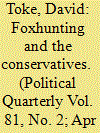|
|
|
Sort Order |
|
|
|
Items / Page
|
|
|
|
|
|
|
| Srl | Item |
| 1 |
ID:
096258


|
|
|
|
|
| Publication |
2010.
|
| Summary/Abstract |
The Conservatives are pledged to have a free vote in Parliament on legislation in Government time to reverse the 2004 Hunting Act. This Act bans hunting with dogs. The Countryside Alliance has opposed the Hunting Act as part of campaigns to defend its notion of rural interests. The Countryside Alliance's success in gaining the Tory pledge could be underscored by a Tory hope that hunting supporters give decisive support for Tory candidates in marginal Parliamentary constituencies. However, the Tory leadership may find it politically difficult to give early priority to legislative attempts to repeal the Hunting Act. Moreover, it is likely to require a large Tory majority and years of waiting before a Tory government is able and willing to complete a repeal of the hunting ban.
|
|
|
|
|
|
|
|
|
|
|
|
|
|
|
|
| 2 |
ID:
122467


|
|
|
|
|
| Publication |
2013.
|
| Summary/Abstract |
Political support for renewable energy development, especially offshore renewables, is particularly conspicuous in Scotland and is a centrepiece of SNP policy. However, this is built on something of a paradox because, put simply, without the subsidies paid by electricity consumers in the rest of the UK, the Scottish Government's ambitious targets for renewable energy would be politically unachievable. We argue in this paper that if Scotland does move towards independence, then there could be little reason for the UK to continue paying (much) of the subsidies since the resulting renewable generation would no longer contribute towards UK renewable energy targets. We suggest that the potential scenarios, and their implications, needs to be far better considered in the arguments around the Scottish constitutional position and the broader aims of UK energy policy.
|
|
|
|
|
|
|
|
|
|
|
|
|
|
|
|
| 3 |
ID:
102451


|
|
|
|
|
| Publication |
2011.
|
| Summary/Abstract |
As is pointed out in this special section, investment in offshore wind deployment is set, at least according to projections made by the European Wind Energy Association (EWEA), to outpace investment in onshore wind power in Europe after 2020. It is estimated that by 2030 investment in offshore wind power will total around 16 billion euros a year. That makes it a very important (sub) technology indeed, and one that merits more study than has hitherto been manifest. Hence, there is a strong rationale for this special section. Key policy issues for offshore wind power include financial issues, which are dealt with most of all by Green and Vasilikos, but also by Toke, Soderholm and Pettersson and Moller in various ways. Planning issues also feature strongly in several papers. Spatial planning analysis is developed to include quantitative techniques by Moller. Haggett analyses the literature on public responses to wind power, a crucial issue given the perennial difficulties with obtaining consent for wind power projects of all types. There is also attention to case studies in the papers by Soderholm and Toke
|
|
|
|
|
|
|
|
|
|
|
|
|
|
|
|
| 4 |
ID:
110702


|
|
|
|
|
| Publication |
2011.
|
| Summary/Abstract |
The UK Government has published a White paper on Electricity Market Reform, which precedes legislation with a declared aim of delivering secure, clean and decarbonised electricity supply. It introduces interventionist methods aiming to promote a nuclear power construction programme, a streamlined renewables programmes and a system to ensure that generation capacity is built to cope with variability in electricity output. However, the policies announced to date are likely to fail in delivering the promised nuclear programme and the system of 'feed-in tariffs' announced for renewables is stunted and made less efficient by a desire to integrate it with the prevailing electricity market arrangements. The effect of the changes in the White Paper is likely to be incremental rather than revolutionary.
|
|
|
|
|
|
|
|
|
|
|
|
|
|
|
|
| 5 |
ID:
103597


|
|
|
|
|
| Publication |
2011.
|
| Summary/Abstract |
The British offshore windfarm programme presages the emergence of Britain as more of a leader than a laggard in renewables, the latter being the status it has hitherto endured in comparison to countries such as Denmark, Germany and Spain. Britain looks increasingly likely to exceed 20% of electricity being supplied from renewable energy by 2020, provided there continues to be adequate financial incentives for renewable energy. This turnaround is associated with increased British concerns about energy dependence on imported natural gas as well as pressure from EU legislation. However there are many planning pressures that countervail the drive for offshore wind power. British planning policy on offshore wind is distinctive (compared to other EU states) for its pragmatic, 'criteria based', approach that appears to favour offshore wind power development. The extent of the British offshore wind power programme is likely to depend heavily on consumer reactions to price increases caused by the offshore wind power programme.
|
|
|
|
|
|
|
|
|
|
|
|
|
|
|
|
|
|
|
|
|